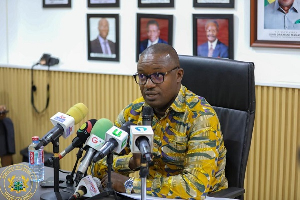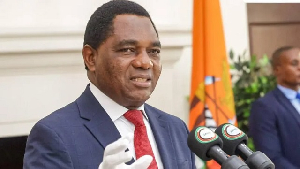The Minister for Energy and Green Transition, John Jinapor, has commissioned a seven-member technical committee to develop a report on a model and pathway for private sector participation in Ghana’s energy distribution sector.
Speaking at a brief ceremony on Friday, January 24, 2025, the minister stated that the initiative aligns with the promise made by the National Democratic Congress and President John Dramani Mahama during the 2024 political campaign to enhance efficiency in the nation's power distribution sector.
He expressed strong confidence in the competence, commitment, and integrity of the committee, chaired by Jabesh Amissah-Arthur, and urged them to fulfill their terms of reference.
“The committee’s main duty is to consult extensively: engage consumers, technical players, industry professionals, unions, and all other stakeholders. Following their consultations, they are to advise this ministry on the best way forward to ensure private sector participation in Ghana’s power distribution sector,” he said.
The minister emphasised the importance of ensuring order in the nation’s power distribution chain and reiterated his commitment to achieving this during his tenure.
He assured the public that private sector participation would serve the sole interest of the country and be devoid of personal interests.
He urged the committee to prioritize local content participation, reflecting the government’s commitment to promoting local business ownership.
The technical committee members include:
Mr. Jabesh Amissah-Arthur (Chairman)
Mr. Benjamin Boakye
Dr. Shafic Sulemana
Dr. Simon Akorli
Mr. Ebenezer Baiden
Lawyer Emmah Aku Bulley
Mr. Edward Abrokwah
Representatives of stakeholders in the energy generation and distribution sector, including the Electricity Company of Ghana (ECG) and the Northern Electricity Distribution Company (NEDCO), were also present for the committee's inauguration.
On his part, the committee chairman, Mr. Jabesh Amissah-Arthur, assured the minister of the committee’s commitment to delivering its mandate through extensive engagement with stakeholders, including consumers.
“Let me express our appreciation for the trust placed in us to undertake this assignment. None of us underestimates the challenges involved, and we pledge to work diligently. We will pay attention to recommendations, lessons from past efforts, and interventions that address the concerns of electricity service customers. We will prioritize financial sustainability and consider the needs of all stakeholders, including business owners, staff, and management,” he said.
Amissah-Arthur further highlighted the importance of addressing weaknesses in the power distribution sector and prioritizing homegrown approaches and strategies to ensure the local private sector has the first opportunity to participate in interventions.
During his ministerial vetting, the Energy Minister emphasized the significance of transparency and stakeholder engagement throughout the process of introducing private sector involvement in energy distribution.
He noted that the initiative must cater to the interests of both consumers and employees of state-owned entities.
The minister also acknowledged challenges within the sector, including procurement infractions and revenue losses faced by ECG and other players, which the committee is expected to address in its recommendations.
Business News of Friday, 24 January 2025
Source: www.ghanaweb.com













